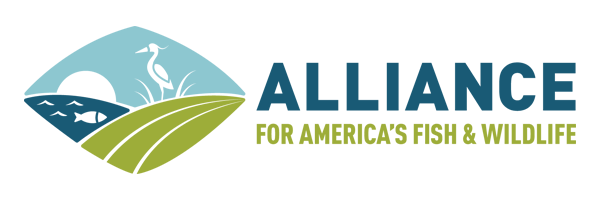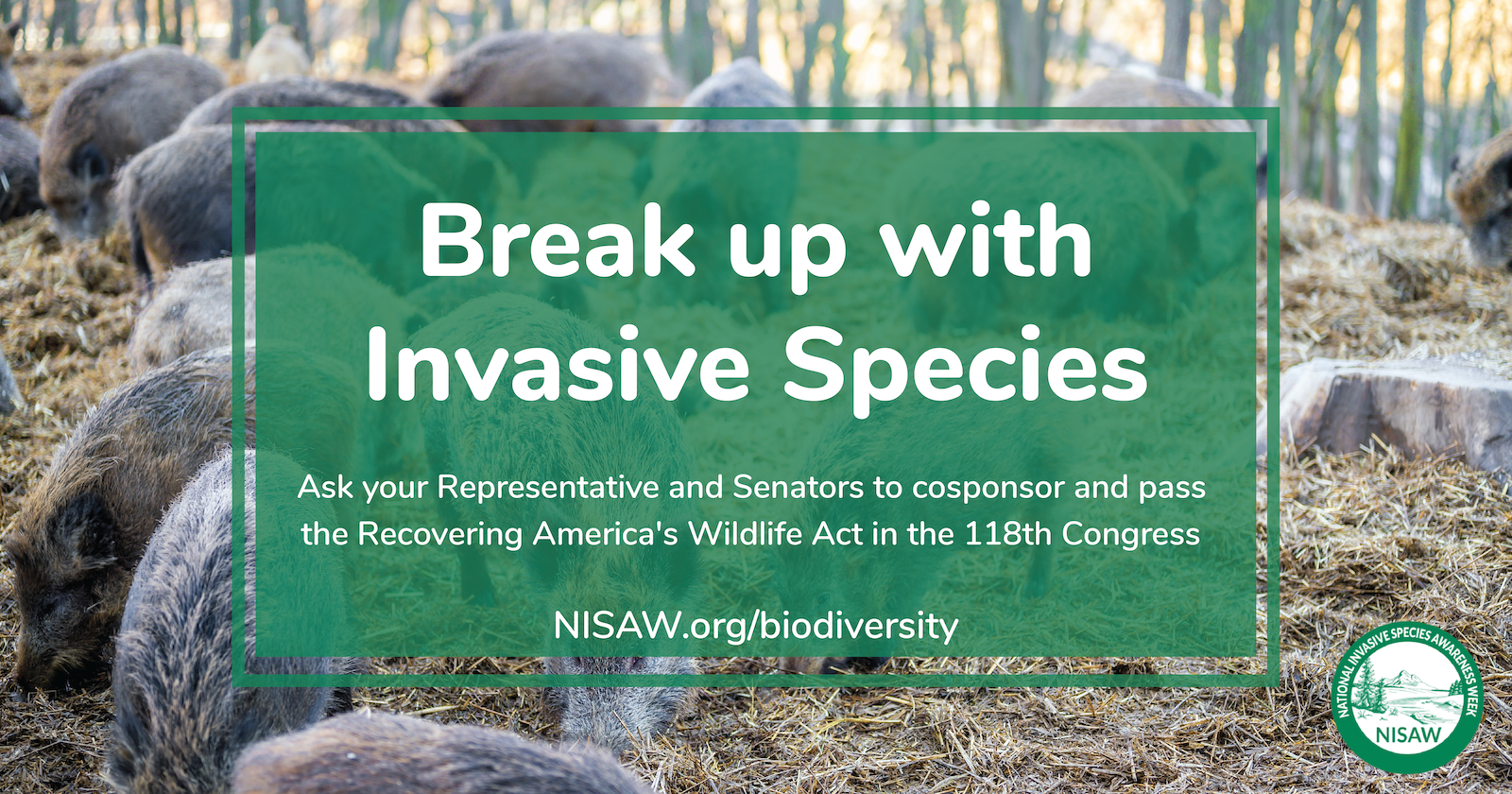Download position paper → | Take Action →
Biodiversity and Invasive Species
Biologically diverse, native ecosystems are critical to human health and sustainable economies. North American Invasive Species Management Association (NAISMA) supports the conservation of North America’s native biodiversity and recommends the prioritization and implementation of legislation, policy, and funding that reduces threats to biodiversity resulting from invasive species.
Nearly one fifth of the Earth’s surface is at risk of plant and animal invasions, impacting native species, ecosystem functions, economies, and human health. The rate of introduction of new invasive species is higher than ever before and shows no signs of slowing.
Invasive species cause biodiversity loss and can weaken habitat resilience. Preventing and stopping the spread of these harmful non-native plants, animals, and pathogens is critical to conserving biodiversity and protecting high-value areas. Because invasive species cross boundaries, effective prevention efforts demand coordinated action across international, federal, tribal, state, local, and private jurisdictions, along with sufficient resources to implement science-guided strategies.
The members of NAISMA comprise the only international organization solely focused on empowering the management of invasive species. NAISMA is uniquely positioned to help land and water owners or managers to work together across jurisdictional boundaries.
U.S. federal agencies are directed by Section 7. (a) of the Endangered Species Act (ESA) to carry out “programs for the conservation of endangered species and threatened species.” (Endangered Species Act, 16 U.S.C. 1531-1544, U.S.C. § 7 (1973). Since invasive species directly and indirectly harm endangered species and critical habitats, their prevention and control are aspects of the work of multiple federal agencies. However, federal agencies alone cannot protect biodiversity. They must also have effective working partnerships with numerous and diverse natural resource managers. Adequate resources are critically needed to support efforts.
NAISMA can help foster working partnerships by assisting with joint planning, collecting data, leading interjurisdictional “cross-training” exercises, providing networking and professional development opportunities, raising public awareness, and other services. Importantly, NAISMA members can also take direct on-the-ground action.
LEGISLATIVE RECOMMENDATIONS:
- Appropriate funding for invasive species as authorized in the Infrastructure Investment and Jobs Act (PL 117-58).
- Conserve and protect water infrastructure, aquatic resources, and outdoor recreation by supporting policy and funding that aims to stop the spread of invasive mussels.
- Enhance the nation’s biosecurity by cosponsoring and advancing Lacey Act Amendments.
- Improve invasive species provisions within the Farm Bill for the protection of domestic food and water supplies.
- Include invasive species in climate change legislation, policy, management, and research.
- Increase funding for the Aquatic Nuisance Species (ANS) Task Force, Regional Panels, State ANS Plans, and Species Management Plans as authorized in the National Invasive Species Act (1997).
- Create and fund an Office of Invasive Species within NOAA headquarters that can serve as the Co-Chair of the ANS Task Force and fully engage in coordination nationwide.
- Maximize efforts through the Water Resources Development Act for watercraft inspection and decontamination, aquatic plant management, early detection monitoring, and rapid response by streamlining internal procedures for implementation and reducing grant match requirements for recipients.
- Protect our nation’s biodiversity by cosponsoring and working to advance the Recovering America’s Wildlife Act.
- Provide critical funding for invasive species by cosponsoring and working to advance the STAMP Act.
- Take action to protect forests by cosponsoring the Invasive Species Prevention and Forest Restoration Act.
POLICY RECOMMENDATIONS:
- Adopt model legal frameworks and facilitate cross-jurisdictional implementation of science-based standards that minimizes risk associated with high priority pathways for invasive species spread including live aquatic bait, watercraft inspection and decontamination, and certified weed free products.
- Implement standardized training for invasive species professionals and federal land and water managers to ensure the readiness of employees for prevention, early detection, rapid response, control, monitoring, outreach, and enforcement.
- Increase collaboration between the U.S. Department of Agriculture and the U.S. Fish and Wildlife Service to ensure consistent and prioritized enforcement at our nation’s borders to enhance biosecurity.
- Promote best management practices for integrated pest management and restoration.
- Reduce invasive annual grasses that contribute to catastrophic wildfires and support invasive species management activities related to the Wildland Urban Interface (WUI).
- Support the implementation of mandatory watercraft inspection and decontamination (WID) and other cross-jurisdictional containment and prevention strategies to stop the spread of zebra and quagga mussels and other aquatic invasive species (AIS) from overland dispersal via recreational watercraft.
- Support for biocontrol research and implementation to minimize impacts associated with the long-term management of established invaders.
Recovering America’s Wildlife Act (RAWA)
The Recovering America’s Wildlife Act (RAWA) is a bipartisan effort focused on funding the conservation or restoration of wildlife and plant species of greatest conservation need; the wildlife conservation strategies of states, territories, tribes, and the District of Columbia; and wildlife conservation education and recreation projects. The House passed the Recovering America’s Wildlife Act (H.R.2773) last year and the Senate bill (S.2372) had 47 bipartisan cosponsors in the 117th Congress.
The Recovering America’s Wildlife Act (S.1149) was reintroduced by Senators Heinrich and Tillis on March 30th, 2023. I respectfully ask you to please consider cosponsoring this transformational bill and pass it as soon as possible. Our wildlife simply can’t wait any longer.
The North American Invasive Species Management Association (NAISMA) supports RAWA because it will provide critical resources to wildlife professionals tasked with conserving the diversity of America’s native species. Invasive species pose one of the largest threats to wildlife and have contributed to the need to list more than 42 percent of the organisms currently listed under the Endangered Species Act. For example, the Channel Islands faced an ecological collapse due in part to invasive feral hog populations. A recovery program involving removing the invasive pigs successfully saved endemic island foxes; fox subspecies listed as endangered were delisted in fewer than two decades.
Ask your Senators and Representative to cosponsor and pass the Recovering America’s Wildlife Act. Take Action →
Invasive species create an estimated $137 billion annual strain on the U.S. economy. Among other provisions, RAWA could provide $97.5 million annually to fund proactive wildlife conservation efforts on tribal lands and $1.3 billion in dedicated funding annually for the implementation of state fish and wildlife agencies’ wildlife action plans (SWAPs). The majority of SWAPs already identify the need to prevent, control, and manage invasive species to protect native and imperiled species, maintain outdoor recreation, sustain industry, and protect our nation’s water and food supplies.
RAWA will enable our fish and wildlife agencies to address more than 12,000 species in need of conservation before a listing as endangered or threatened under the Endangered Species Act is required. It will also put Americans back to work across the country safeguarding our natural resources and infrastructure. NAISMA encourages prioritization of RAWA funds to prevent and manage invasive species on public lands and waters.
You can take action by contacting your U.S. Representative and Senator to encourage them to cosponsor and reintroduce RAWA in the 118th Congress. Ask them to work to advance and pass this critical piece of legislation for American’s wildlife and natural spaces.
See more from NAISMA Government Relations.
Organizations
NAISMA has joined the Alliance for America’s Fish & Wildlife.

Social Media Posts on Biodiversity and Invasive Species
Please share and use the hashtag #NISAW!







